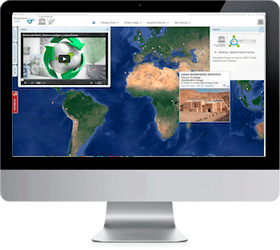The El Hierro Declaration
ENERGY AT THE CROSSROAD
100% renewable energy empowering local communities
On the path towards sustainable energy, some islands and regions have shown that a renewable future is possible. These are the new renewable energy lighthouses emerging all over the world.
At the beginning of the UN Decade of Sustainable Energy for All, renewable energy has become the only way forward. Renewable energy is now highly efficient, and matches the needs of citizens. Renewable energy is the foundation of a sustainable society; it can mitigate climate change and improve the environment.
Renewables represent a global opportunity to drive green economies and to improve access to water, clean transport and healthy housing.
Even today, not everybody has access to energy, with four billion people having limited access, and 1.3 billion with no access at all.
100% renewable energy is possible
Participants in the 2014 RENISLA Global Forum, meeting in the island of El Hierro, UNESCO’s biosphere reserve, Canary Islands, Spain, on 25th and 26th June 2014,
Being aware that energy, and the right for energy, lies at the heart of all human, social, economic and environmental endeavours, and that it is also the main challenge for sustainable development.
Recognising as well that the transition to renewable energy and energy efficiency presents one of the greatest investment opportunities -and challenges- of the 21st century.
Taking into account that development is not possible without energy, and sustainable development cannot be achieved without renewable energy.
Appreciating that renewable energy has already reached technological maturity and economic competitiveness.
Considering the need to develop a new energy culture based on sustainability, efficiency and equity.
Agree:
1. The time has come for an urgent shift from fossil fuels to renewable energy.
2. There has been an impressive technological progress allowing for the mainstreaming of renewable energy. 100% renewable energy solutions are now widely available, efficient and sustainable.
3. Transition to 100% renewable energy requires the full engagement of the institutional frameworks and governments.
4. This shift in the energy culture requires a grassroots approach, where citizens and local communities come first.
5. The new 100% renewable energy model must also involve knowledge institutions, entrepreneurs, industry and managers at local, regional, national and international level.
6. Islands and isolated energy regions now have the chance to turn problems into opportunities by implementing 100% renewable energy solutions.
7. A call for action should be made to institutions in order to urgently define a road map, which must include strategic objectives and a programme of work.
Call for action
The Governing Bodies of UNESCO, particularly its Executive Board, the International Coordinating Council (ICC) of the MAB Programme and the World Heritage Committee recognize and advocate among the UN and other international organizations the advantages of using UNESCO Sites (Biosphere Reserves and World Heritage Sites) as field observatories on the sustainable use of renewable energy sources, to mitigate climate change, and to enhance and apply the climate change knowledge base for building green societies.
RENISLA as action in partnership with the RENFORUS Initiative (Renewable Energy Futures for UNESCO Sites) initiated by UNESCO, encourages to recognize the success stories on 100% renewable energy in UNESCO sites as projects of reference to foster the transition towards new energy model in a wide range of situations.
UNESCO and IRENA, through the Global Renewable Energy Island Network (GREIN) and RENFORUS, could share and disseminate the approach of El Hierro with Gorona del Viento, as a model for the transition of islands to 100% renewable energy, and a best practice that can be replicated elsewhere.
It is necessary to establish communication channels with the main international actors like IRENA, SE4All, REN21, the European Commission and others, to ensure the dissemination and replication of success stories.
It is proposed to initiate a broader RENISLA outreach campaign in cooperation with relevant institutions and networks that are actively working towards a 100% renewable future, like Renewables 100 Policy Institute, ITC, ARE (Alliance for Rural Electrification), WWF, EUROSOLAR, ITER, IDE, EWH and others.
El Hierro biosphere reserve, Canary Islands, Spain.
26th June 2014
Rapporteurs: Eduardo Fayos Solá, Cipriano Marin, Chiara Ronchini

















